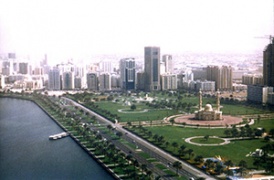09.11.2014

Many Dubai residents have looked towards Sharjah, Ajman and even as north as Ras Al Khaimah for affordable housing options. Dubai's booming real estate sector has done wonders for the UAE's economy but residents in the country have begun to express their displeasure at the skyrocketing rents. Many Dubai residents have looked towards Sharjah, Ajman and even as north as Ras Al Khaimah for affordable housing options. The decline in demand for luxury property has begun to have its affect on the market with developers recognising the need to meet the demand of residents in the city.
A new study from Colliers International has found that nearly half of all households in the emirate earn only between AED9,000 to AED15,000 a month. The report titled 'Addressing the Housing Gap' finds that based on the salaries residents earn, they can afford to spend between AED32,500 and AED54,000 per annum as rent or mortgage payments, as per international standards. This works out to only AED2,700 a month for those at the lower end of the average salary band. It is more than apparent (from a quick look at any property listing website) that very few options exist for people looking for properties in this price-range.
“When we talk about affordable housing in Dubai, we are not referring to low-income housing, but rather housing that is affordable for a household in relation to its income. What this means in the Dubai market is mid-market properties that are suitable for young working families or professionals,” says Ian Albert, regional director at Colliers International. “Owing to the recent growth in rental and sales prices in Dubai, this market segment has chosen to live in neighbouring emirates such as Sharjah and Ajman, where greater options are available to them,” he says.
“This is not only a missed opportunity for Dubai developers who should be looking to capture this sizeable market by creating affordable communities that cater to its needs, but it also directly affects the economy as productivity levels are lowered when a large percentage of the workforce suffers from a long commute,” Albert adds. A survey conducted by MoveSouq.com found that 65% of respondents planned on moving on their next lease renwal.
It is clear that there is a demand from residents for affordable housing options. However, the one good thing is that as a result of government-imposed regulations, the luxury market in the city has become more sustainable. Moreover, leading developers have announced plans to cater to the mid-level segment. "The UAE market is headed for broader stability. Over the next few months, there will be a correction in areas seen as overvalued while at the same time there will be pockets that will maintain their upwards climb," said Haider Khan, CEO of UAE real estate portal Bayut.com.
A new study from Colliers International has found that nearly half of all households in the emirate earn only between AED9,000 to AED15,000 a month. The report titled 'Addressing the Housing Gap' finds that based on the salaries residents earn, they can afford to spend between AED32,500 and AED54,000 per annum as rent or mortgage payments, as per international standards. This works out to only AED2,700 a month for those at the lower end of the average salary band. It is more than apparent (from a quick look at any property listing website) that very few options exist for people looking for properties in this price-range.
“When we talk about affordable housing in Dubai, we are not referring to low-income housing, but rather housing that is affordable for a household in relation to its income. What this means in the Dubai market is mid-market properties that are suitable for young working families or professionals,” says Ian Albert, regional director at Colliers International. “Owing to the recent growth in rental and sales prices in Dubai, this market segment has chosen to live in neighbouring emirates such as Sharjah and Ajman, where greater options are available to them,” he says.
“This is not only a missed opportunity for Dubai developers who should be looking to capture this sizeable market by creating affordable communities that cater to its needs, but it also directly affects the economy as productivity levels are lowered when a large percentage of the workforce suffers from a long commute,” Albert adds. A survey conducted by MoveSouq.com found that 65% of respondents planned on moving on their next lease renwal.
It is clear that there is a demand from residents for affordable housing options. However, the one good thing is that as a result of government-imposed regulations, the luxury market in the city has become more sustainable. Moreover, leading developers have announced plans to cater to the mid-level segment. "The UAE market is headed for broader stability. Over the next few months, there will be a correction in areas seen as overvalued while at the same time there will be pockets that will maintain their upwards climb," said Haider Khan, CEO of UAE real estate portal Bayut.com.






